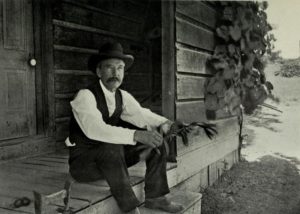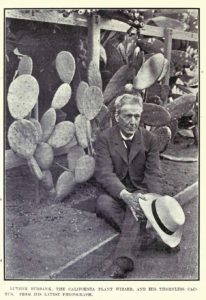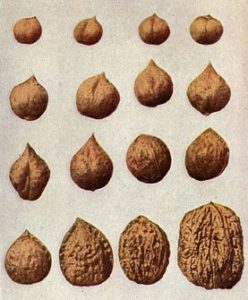Luther Burbank, perhaps the most prolific plant breeder in human history, was born on March 7, 1849, in Lancaster, Massachusetts (died 1926). Although he had very little formal education and was considered un-scientific by his peers, he managed to revolutionize American horticulture during the first decades of the 20th Century.
Burbank was raised on a farm, the 13th of 15 children in the family. He was a curious and resourceful child, inventing machines and tools to ease the work of the farm. His father died when Burbank was 21, allowing him to use his inheritance to buy a small farm of his own and begin plant-breeding experiments. His success began with a potato whose seeds he planted, then chose the most promising and quickly grew large, firm potatoes. With the $150 profit from selling the resulting seeds, he moved to Santa Rosa, California, to be near several brothers who lived there.

He began experimenting with plant varieties in earnest on his small tract in Santa Rosa. His talent for selecting superior plants combined with his skill at grafting, allowed him to make rapid progress in evaluating and replicating desired strains. At one time, he had 3,000 experiments in progress. He marketed his new plants through a catalogue, “New Creations in Fruits and Flowers,” beginning in 1893.
During his long 55-year career as a plant breeder, he introduced more than 800 new types of plants—fruits, nuts, grains, vegetables and flowers. He developed a russet potato, now called the Russet Burbank Potato, that today comprises most of the commercial potatoes used in the United States. He developed a spineless cactus for use as livestock forage in dry climates. He bred the Shasta daisy.

Burbank became friends with Thomas Edison and Henry Ford, like him innovators in their fields of endeavor. After Burbank’s death in 1926, Edison and Ford continued to fight for patent protection for plant breeds, eventually achieving a law that extended patents to plants in 1930; Burbank received several patents posthumously to celebrate that event.
Burbank’s goal was not to become wealthy—he lived a notoriously frugal and simple life. Rather, it was to help humanity by developing plants that could provide better food and more pleasant gardens. Working with nature, not against it, was his fundamental approach. As he said: “If you violate Nature’s laws you are your own prosecuting attorney, judge, jury, and hangman.” On the positive side, he explained his joy in his work at a lecture in San Francisco in 1925:

“What a joy life is when you have made a close working partnership with nature, helping her to produce for the benefit of mankind new…fruits in form, size, color, and flavor never before seen on this globe; and grains of enormously increased productiveness, whose fat kernels are filled with more and better nourishment, a veritable store-house of perfect food—new food for all the world’s untold millions for all time to come.”
And as we all know, hungry people have bigger, more immediate problems than worrying about biodiversity conservation. So, helping people live better, more secure lives—as Luther Burbank did through his plant breeding work—leads inevitably to a more sustainable world that elevates conservation to a priority.
References:
BrainyQuote. Luther Burbank Quotes. Available at: https://www.brainyquote.com/quotes/authors/l/luther_burbank.html. Accessed March 6, 2017.
Famous Scientists. Luther Burbank. Available at: https://www.famousscientists.org/luther-burbank/. Accessed March 6, 2017.
Luther Burbank Home & Gardens. Luther Burbank. Available at: http://www.lutherburbank.org/. Accessed March 6, 2017.
Murphy, Dennis. 2007. Plant Breeding and Biotechnology: Societal Context and the Future of Agriculture. Cambridge University Press. Available at: https://books.google.com/books?id=dCe6JNEplIwC&pg=PA38#v=onepage&q&f=false. Accessed March 6, 2017.
Wieseler, Wayne. 2012. Biology: Luther Burbank, 1849-1926. Western Sonoma County Historical Society. Available at: Accessed March 6, 2017.http://www.wschsgrf.org/articles/biographylutherburbank1849-1926.
